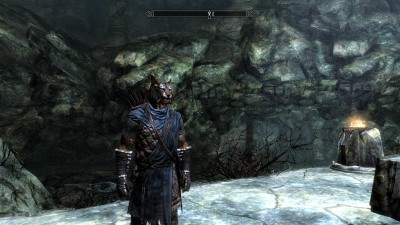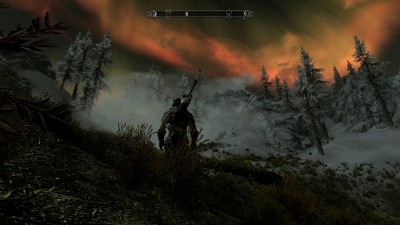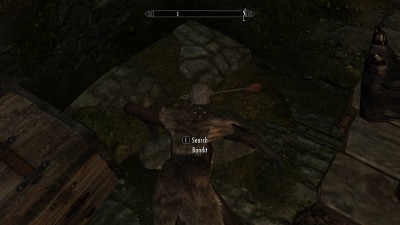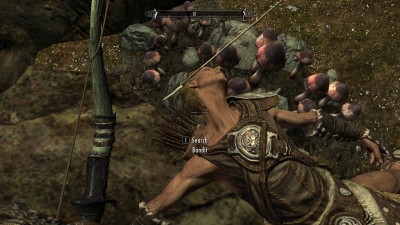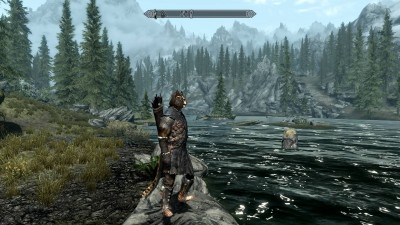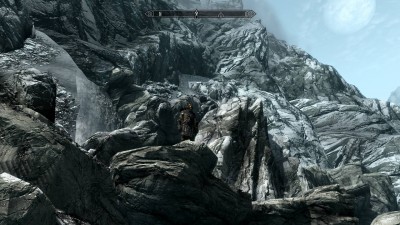My greatest joy in Skyrim comes from the fact that the game doesn’t make me feel as though I’m doing something for the sake of it. Each and every task I perform is its own justification, and many of the trials and tribulations that I endure have been conjured up by my own sense of adventure and exploration. I didn’t need to delve deep into the dwarven ruins I discovered last night, there was no importunate question mark floating above a head, or in a quest log; no expectation haunted my every step, no imperious demand that I perform such and such a feat, in this manner, at this time, in this place, with these tools, and where all other endeavours would be considered void. I felt no quester’s compunction at my failure to follow the stringent MMO method: ticking off lines on a clipboard as each step is performed to exacting specifications in order to observe the inevitable outcome. Nevertheless, I was richly rewarded for my endeavours.
Indeed, the game specifically doesn’t punish the player for avoiding that plodding plotted path, it gives the players a canvas and paint but does not require the use of a brush if you prefer to use your fingers. And although it provides an outline of your character’s existence, it stops well short of putting little numbers across the page to dictate precisely which colour each shape should be. You are free to fill in the bigger picture as the game outlines, but you are equally free to paint over those lines. Therefore, you are able to make a mess of things as much as you are able to make something entirely unique to you. What is important, however, is that the game rewards you however you play. Exploring and experiencing the world, experimenting with it, these things will reward the player’s efforts as much as joining the dotted path of quests.
The upshot of this experience is a phenomenon which many have embraced, while others have railed against it – pointing out the many failings in the game which can also be found in MMOs and elsewhere, and which people are now seemingly happy to ignore, where they complained before.
It is simply the difference between friendship and enmity. In Skyrim I feel as though we are friends, we share similar outlooks and opinions, and we work well together. We don’t often stumble over one another, but when we do we can often resolve the issue amicably. As such, I am aware of Skyrim’s failings but find myself far more willing to forgive them, not least of which because Skyrim has highlighted many of my own failings as a player, and yet continues to reward me regardless. With many MMOs, where I have often found myself railing against them even as I played them, I feel as though we are enemies. The game is out for my money –as much of it as it can gather– and everything I find myself doing in the game is built around the tenet that the more time I have to spend with the game the more money the game earns. As such, I am aware of an MMO’s failings and I find myself less willing to forgive them because I can relate most of them to obstructions, barriers and hardships which are unnecessary outside of the context of this MMO model; more though, even those failings which I could happily otherwise ignore are dispersed by that parsimonious prism of experience, until a single complaint spreads into a spectrum of baser issues.
So Skyrim does indeed cause the player to suffer many of the limits and ludicrosities which have plagued RPGs since gaming began, but it is with these failings accepted that the review scores have been so high. A high score does not reflect a perfect game, it reflects a game which, on balance, has highs which far outweigh the lows. The impression that Skyrim’s positives have left upon me compared to its negatives are as to compare the size of the universe to a grain of sand. Skyrim is not a perfect game, but a game does not have to be perfect and devoid of faults to score highly in the opinion of players and reviewers, what it has to be is a stunning example in its genre.
Skyrim is a stunning example of an RPG, not in the sense of stats and grinding loot for advancement, but in the old sense –one would argue the true sense– of playing a role in a game. It is, ultimately, a game of choice.
Choose grind. Choose a job. Choose a career. Choose dailies. Choose fucking big shoulder pads. Choose stats, pots, mats, and tokens. Choose fed ex, low drop rates and kill ten rats. Choose monthly subscription repayments. Choose a raiding guild. Choose your fleeting guild mates. Choose purple gear and matching weapons. Choose a three piece set bonus in a range of fucking tiers. Choose rep grinds and wondering who the fuck you are on a Sunday morning. Choose sitting on that chair watching mind-numbing spirit-crushing game-play, stuffing fucking junk food into your mouth. Choose rotting away at the end of it all, giving away your stuff to strangers, nothing more than a relic to the selfish, fucked-up brats that have spawned in General Chat to replace you. Choose your future. Choose grind. . . But why would I want to do a thing like that? I chose not to choose grind: I chose something else. And the reasons? There are no reasons. Who needs reasons when you’ve got Skyrim?
